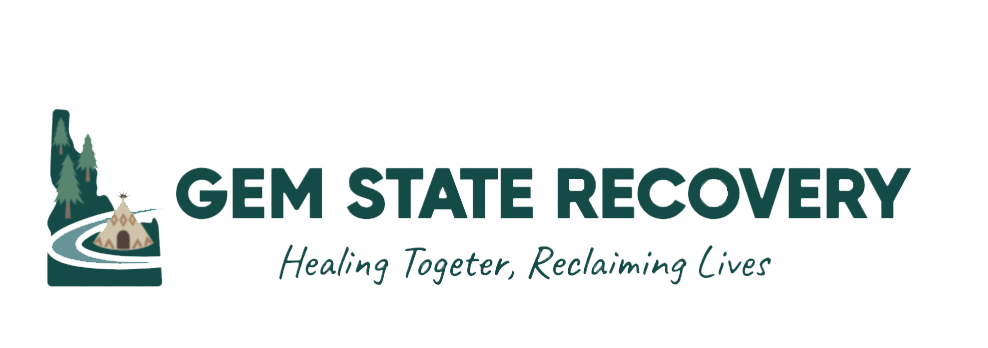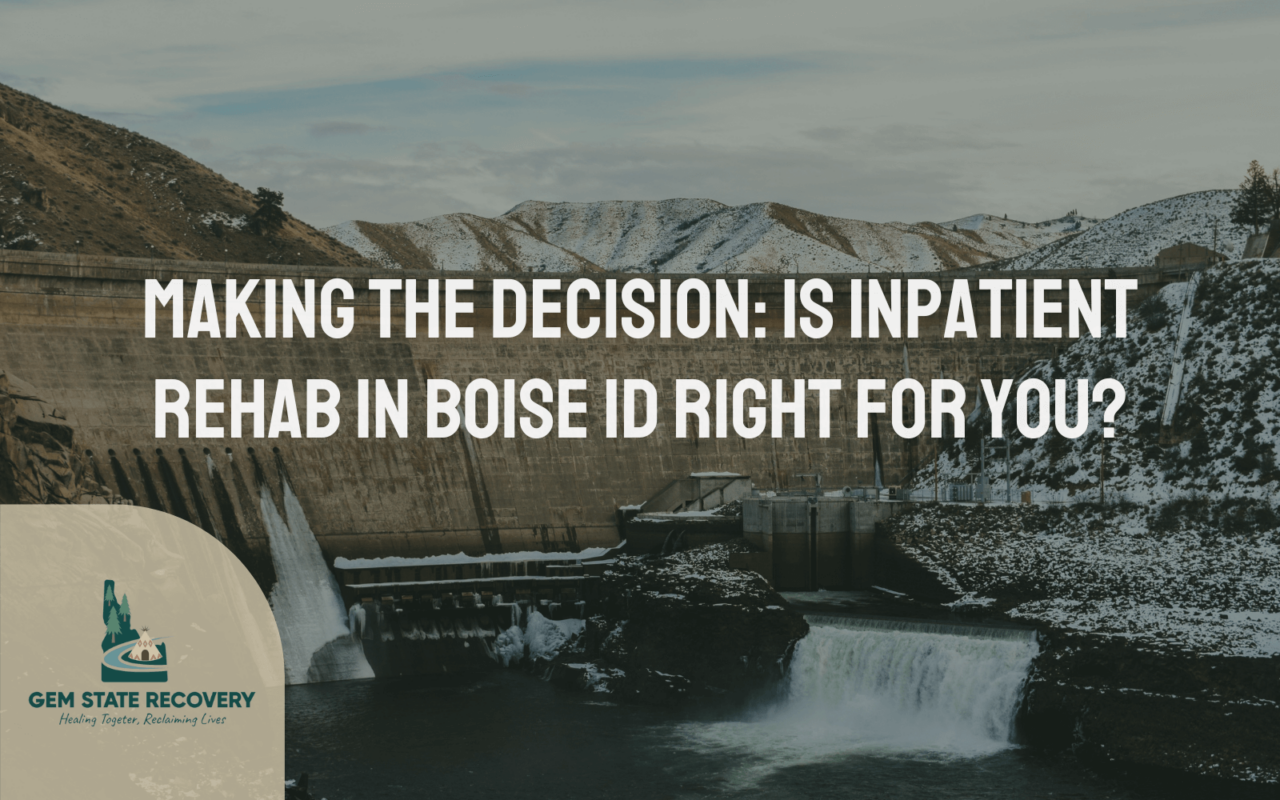Seeking help for addiction is a brave and important choice. Addiction doesn’t just affect the individual—it impacts family, friends, and overall well-being, often leading to strained relationships, financial issues, and poor health. If you or a loved one is struggling, you might feel overwhelmed and wonder if inpatient rehab in Boise ID, is the right path.
At Gem State Recovery, we understand how tough this decision can be. The first step toward recovery is often the hardest but also the most life-changing. Our goal is to offer clarity and support as you explore your options. Inpatient rehab provides the structure, care, and tools needed for lasting sobriety.
This guide covers everything you need to know, including the benefits of inpatient rehab, what to expect during treatment, and how to decide if it’s right for you or a loved one. With 24/7 medical and emotional support and personalized treatment plans, inpatient rehab addresses the complexities of addiction in a safe, supportive environment. Whether you’re just starting to think about rehab or actively searching for a program, this guide will help you take a confident step toward a healthier future.
Understanding Addiction and the Need for Treatment
Before deciding on a treatment plan, it is essential to have a clear understanding of addiction itself. Addiction is a chronic and complex disease that profoundly impacts brain function and behavior, often making it incredibly challenging for individuals to stop using substances despite experiencing significant negative consequences. Understanding its effects and mechanisms is the first step toward recovery.
The Science Behind Addiction
Addiction fundamentally alters the brain’s chemistry and functioning. Substance use releases abnormally high levels of dopamine, a neurotransmitter associated with pleasure, motivation, and reward. This flood of dopamine creates intense feelings of euphoria, reinforcing the drug use behavior. Over time, the brain adapts by producing less dopamine naturally or reducing the number of dopamine receptors, leaving individuals unable to feel normal or experience pleasure without the substance. This leads to compulsive drug-seeking behavior, making it extremely difficult for individuals to quit on their own, even when they are aware of the harm caused by their addiction. This cycle can create a powerful grip that often requires professional support to overcome.
The Consequences of Untreated Addiction
If addiction is left untreated, the consequences can be devastating, affecting nearly every aspect of an individual’s life. Some of the most common and severe consequences include:
- Physical health problems: Prolonged substance abuse can result in severe physical health complications such as liver damage, heart disease, respiratory issues, gastrointestinal problems, and a weakened immune system, which increases vulnerability to infections and illnesses.
- Mental health disorders: Addiction often coexists with mental health issues like anxiety, depression, paranoia, and even psychosis. These conditions can worsen with continued substance use, creating a harmful cycle that is challenging to break.
- Strained relationships: Addiction takes a heavy toll on personal relationships, leading to conflicts, broken trust, and emotional distance from family and friends. Over time, social isolation becomes common as individuals prioritize substance use over meaningful connections.
- Legal and financial troubles: The pursuit of substances can lead to legal problems due to criminal behavior such as theft or driving under the influence. Financial struggles often arise as individuals spend excessive amounts of money on their addiction, frequently leading to debt or bankruptcy.
- Loss of employment and housing: Addiction can impair job performance, attendance, and focus, often resulting in job loss. Homelessness becomes a risk when financial instability and strained relationships compound these challenges.
The Path Toward Recovery
Seeking professional treatment, such as inpatient rehab in Boise ID, can help break the destructive cycle of addiction. Inpatient rehabilitation offers a structured environment where individuals can access medical care, counseling, and support tailored to their needs. These programs provide the tools and strategies necessary for long-term recovery, helping individuals rebuild their lives and regain control. With the right treatment and support, recovery is not only possible but achievable.
Inpatient Rehab vs. Outpatient Rehab: Which One Is Right for You?
There are different levels of care available for addiction treatment, and choosing the right one depends on individual circumstances.
Key Differences Between Inpatient and Outpatient Rehab
|
Feature |
Inpatient Rehab |
Outpatient Rehab |
|---|---|---|
|
Duration |
30-90+ days |
Varies (weeks to months) |
|
Residential Stay |
Yes |
No |
|
Supervision |
24/7 medical and emotional support |
Limited to scheduled sessions |
|
Ideal For |
Severe addiction, co-occurring disorders, unstable home environments |
Mild to moderate addiction, strong support systems at home |
|
Cost |
Generally higher due to housing and 24/7 care |
More affordable |
Inpatient rehab in Boise ID is recommended for those who need a highly structured environment to avoid triggers and focus entirely on recovery.
The Benefits of Inpatient Rehab in Boise ID
Choosing an inpatient rehab program offers numerous advantages that can significantly impact the recovery process, providing individuals with the tools and support they need to overcome addiction and build a healthier future.
1. A Safe, Drug-Free Environment
Inpatient rehab provides a safe, controlled environment that removes individuals from everyday triggers and environments where they may feel tempted to use substances. This separation creates a clean slate, allowing them to focus entirely on their recovery. It eliminates distractions and reduces the risk of relapse, giving individuals the chance to rebuild their lives with a strong foundation.
2. 24/7 Medical and Emotional Support
Withdrawal symptoms can often be physically painful and mentally exhausting, even dangerous in some cases. Cravings can feel overwhelming, especially in the early stages of recovery. In an inpatient program, medical professionals and counselors are available around the clock to ensure safety, manage withdrawal symptoms, and provide immediate emotional or psychological support when it’s most needed. This constant care provides peace of mind and minimizes the risks associated with detox and early recovery.
3. Structured Daily Routine
One of the key benefits of inpatient rehab is the highly structured routine it provides. From morning to evening, patients follow a carefully planned schedule that includes individual therapy sessions, group counseling, educational workshops, and recreational activities. This structure helps patients develop a sense of discipline and purpose while creating healthy habits that can be carried forward into everyday life. A consistent routine also leaves little room for boredom or negative influences, keeping the focus on recovery.
4. Personalized Treatment Plans
At Gem State Recovery, we understand that every individual’s journey is unique. That’s why we create personalized treatment plans tailored to meet each person’s specific needs, challenges, and goals. These plans might include a mix of therapies, such as cognitive behavioral therapy, family counseling, or holistic approaches like yoga and meditation. This customization ensures a more effective recovery process, leading to better outcomes and a higher chance of achieving long-term sobriety.
5. Therapy for Underlying Mental Health Conditions
Addiction rarely exists in isolation. Many individuals struggling with substance use disorders also face co-occurring mental health conditions like depression, anxiety, PTSD, or bipolar disorder. Inpatient rehab offers integrated treatment that addresses both addiction and these underlying issues. Dual-diagnosis therapy helps patients uncover the root causes of their addiction and develop healthier ways to manage their mental health, ultimately breaking the cycle of substance abuse.
6. Peer Support and Community
Recovery can feel isolating, but inpatient rehab fosters a sense of community that encourages connection and mutual support. Being surrounded by others who understand the challenges of addiction is incredibly empowering. Through group therapy sessions, shared activities, and informal conversations, patients can build meaningful relationships and gain strength from the collective experience of others who share their journey. This camaraderie plays a vital role in building confidence and hope for the future.
7. Focus on Long-Term Recovery and Relapse Prevention
Sobriety isn’t just about stopping substance use—it’s about maintaining recovery for the long haul. Inpatient programs emphasize relapse prevention by teaching individuals practical coping strategies, stress management techniques, and communication skills that can be applied in real-world situations. Patients also collaborate with counselors to create a comprehensive aftercare plan, which might include outpatient therapy, 12-step programs, or continued support groups. This focus on long-term recovery equips individuals with the tools needed to stay sober and thrive beyond rehab.
Inpatient rehab provides a holistic approach to recovery, addressing not just the physical aspects of addiction but also the emotional, mental, and social factors that contribute to substance use. If you or a loved one are ready to take the first step toward lasting change, consider the many benefits of inpatient rehab and the personalized care offered at Gem State Recovery. A healthier, more fulfilling life is waiting—take the step today.
A Typical Day in Inpatient Rehab in Boise ID
Understanding the daily schedule can help ease concerns about what to expect during treatment.
Morning Routine
- Wake up early and engage in a mindfulness activity such as meditation or yoga
- Healthy breakfast to fuel the body for the day
- Morning therapy session (individual or group)
Afternoon Activities
- Cognitive Behavioral Therapy (CBT) or Dialectical Behavior Therapy (DBT)
- Educational workshops on addiction, coping skills, and relapse prevention
- Holistic therapies such as music therapy, art therapy, or fitness sessions
Evening Routine
- Group discussions or 12-step meetings
- Personal reflection time or journaling
- Wind-down activities such as reading or light exercise
Each day is carefully designed to support both physical and mental healing.

The Role of Family in the Recovery Process
Addiction impacts not just the individual but their entire network of loved ones, creating emotional, financial, and relational challenges. Because of this, family involvement is a key part of the recovery process and can make a significant difference in long-term outcomes.
Family Therapy Sessions
Many inpatient rehab programs, including Gem State Recovery, prioritize family involvement by offering family therapy sessions. These structured sessions aim to:
- Address past conflicts and rebuild trust: Addiction can strain relationships, but family therapy provides a safe space to work through lingering pain and resentment.
- Educate family members about addiction as a disease: Understanding that addiction is a medical condition, not a moral failing, helps reduce stigma and fosters compassion.
- Develop healthy communication skills: Families learn how to express concerns and support their loved one in a constructive, non-confrontational way.
How Families Can Support a Loved One in Rehab
Families play a vital role in supporting the recovery journey. Here are some actionable ways they can help:
- Stay involved: Attend family therapy sessions, counseling, or support groups like Al-Anon to better understand addiction and recovery.
- Provide encouragement, not judgment: Celebrate small victories and reassure your loved one that recovery is possible, avoiding blame or criticism that could discourage progress.
- Set healthy boundaries: It’s essential to avoid enabling behaviors, like covering up for mistakes or providing financial support that may feed the addiction.
- Educate themselves about addiction and recovery: The more informed family members are, the better equipped they’ll be to help their loved one navigate challenges.
A strong, informed, and compassionate support system can make a world of difference. It not only helps the individual in rehab rebuild their life but also strengthens family bonds, creating a foundation for lasting recovery and healthier relationships for everyone involved.
Post-Rehab: Transitioning to Life After Treatment
Completing inpatient rehab in Boise ID is a significant milestone in the journey to recovery, but maintaining sobriety requires consistent effort and commitment. Recovery doesn’t end when rehab does—it’s a lifelong process that benefits from structure, support, and a clear plan moving forward.
Creating a Relapse Prevention Plan
A relapse prevention plan is an essential tool for maintaining sobriety after rehab. It typically includes:
- Identifying personal triggers and developing coping strategies: Recognizing the situations, emotions, or environments that may lead to cravings is the first step. From there, creating healthy coping mechanisms—such as mindfulness, exercise, or journaling—can help you navigate these challenges successfully.
- Continuing therapy through outpatient programs or support groups: Ongoing therapy, such as cognitive-behavioral therapy (CBT) or group counseling, helps reinforce the skills learned in rehab while addressing new challenges. Support groups like Alcoholics Anonymous (AA) or Narcotics Anonymous (NA) offer shared understanding and accountability.
- Building a network of sober friends and mentors: Surrounding yourself with people who support your sobriety is critical. Sober friends, mentors, and sponsors can provide guidance, encouragement, and a sense of belonging as you build your new life.
Sober Living Homes as a Transitional Step
For many individuals, the transition from inpatient rehab back to everyday life can be overwhelming. Returning to the same environment and routines can pose challenges to maintaining sobriety. Sober living homes act as a bridge, offering a structured, substance-free environment where individuals can gradually adjust to independent living. These homes provide accountability, peer support, and a sense of community, helping residents practice the skills they’ve learned in rehab while building a strong foundation for the future.
The Importance of Aftercare
Aftercare is a vital component of long-term recovery, providing ongoing support to help individuals stay on track. At Gem State Recovery, we offer comprehensive aftercare services, including:
- Outpatient counseling: Regular therapy sessions help address any new challenges or underlying issues that may arise.
- Participation in 12-step programs: Alcoholics Anonymous (AA), Narcotics Anonymous (NA), and similar programs foster connection and accountability while reinforcing a commitment to sobriety.
- Alumni programs and follow-up check-ins: Staying connected with the recovery community and receiving periodic check-ins can provide encouragement and additional resources when needed.
Recovery is not a destination but a journey, and having a solid aftercare plan in place is the key to long-term success. With the right tools, support, and mindset, individuals can continue to build a fulfilling, sober life one step at a time.
Final Thoughts: Is Inpatient Rehab in Boise ID Right for You?
Deciding to enter inpatient rehab in Boise ID is a life-changing step that requires courage and commitment. If you or a loved one is struggling with addiction, seeking professional help can provide the support and structure needed to achieve lasting recovery.
At Gem State Recovery, we are dedicated to helping individuals break free from addiction and rebuild their lives. Our compassionate team is here to guide you through every step of the process.
If you are ready to take the first step toward a healthier, sober future, contact Gem State Recovery today. Our specialists are available to answer any questions and help you get started on your journey to recovery. Visit our website https://gemstaterecovery.com/ or call us at (208) 314-3107.





